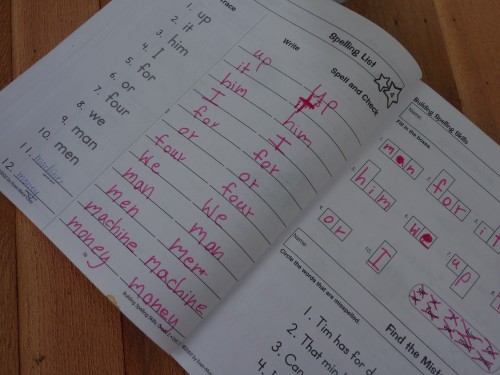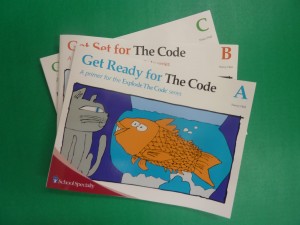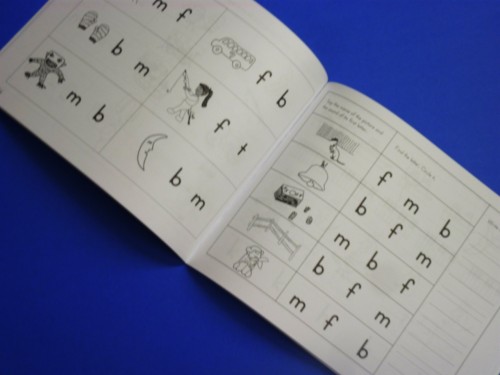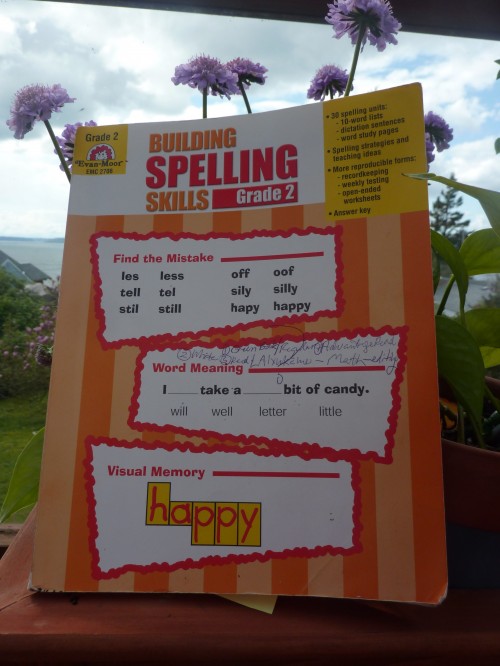Summary: How to teach spelling to a child who struggles with it, and our favorite resources for spelling, phonics, and early reading. Note - This post may included affiliate links to products that we love and have used or would use in our own homeschool. Please see my disclosure policy.
But it can come very slowly to our young writers. Do you find that with your young writers, too?
My daughter was a struggling speller. Do you have a child, like me, who feels she should already know things, before she had learned them?
Spelling and Writing
My 2e daughter, as a young learner, was all about writing, but had trouble spelling. She loved to make little books, write in her Hello Kitty journal, and do very simple reports, usually on penguins or airplanes.
But when it came to spelling, she struggled. She did not have a special need in their area, was not dyslexic, but just had trouble learning to spell.
She tended to spell phonically, ie, how she thought the word sounded. And many kids do that, in the primary, and even the later elementary grades.
I didn't want to squash her creativity by correcting each misspelled work in her written work.
One of the hardest things my 2e daughter encountered as a young learner was having her work corrected. If I showed her a spelling error on an essay, she was crushed. Then that would inhibit her desire to write, which of course we wanted to avoid.
Sharing today, how we deal with her spelling struggles while not inhibiting her passion for writing.
Let's start at the beginning...
1. Written Work with Lots of Spelling Errors
When my child do her weekly spelling work, she did quite well. But applying that to her writing just was not happening. When she wrote essays, stories, or whatever, she tended to fall back to spelling her words phonetically.
She just could not transfer the skills developed in her spelling lessons to her written work...for many years.
She loved to write in her Hello Kitty journal and create simple reports, usually on penguins, toucans, or airplanes. She also enjoyed creative writing, and made her own fiction stories.
Correcting her spelling left her frustrated and upset. As a 2e kid, being corrected was such a blow to her self esteem. She felt that she should already know things....before she had time to acquire the skills.
Can you relate?
We wanted her to feel free to express herself in writing. So we needed to find a way to separate spelling skills from her written work.
So next, let's look at how we did that....
2. Separating Spelling for Written Work

I didn't want to squash her creativity by correcting her misspelled work in her written work.
Our plan was simple - We did spelling work, with spelling tests each week. And we also did a lot of written work without correcting her spelling,.....at all.
This freed up my daughter and then her written work flourished.
At the same time, she was developing spelling skills through separate spelling study. Some would say that would lead to bad habits in spelling....But it didn't.....for her.
And eventually, she learned to apply her spelling skills to her written work. Next, here's what we used for spelling curriculum in the meanwhile...
3. Phonics Based Spelling Resources
 |
| This phonics program is research based. |
During the K and early elementary years, our spelling was done through the Explode the Code series. We were using this program anyway, for phonics. While our student was learning phonics, she was also learning spelling.
This program is offered for kids from preschool through 6th grade. It is research based and has been shown to improve reading skills in students who use their curricula. It is also one of the approaches that is recommended for kids with dyslexia, although my daughter did not have that issue.
We started with their pre-K Primers. For more information on that, feel free to check out my post on Explode the Code.
Using these primers not only gave my daughter a good start in both phonics and spelling, but it also gave her a feeling of success, which was so important to her. And phonics is the basis for spelling of course. We continued with Explode the Code through elementary..
Explode the Code - Elementary
 |
| This phonics program goes from preK through 6th grade. |
We continued working in the Explode the Code series each year, starting in Explode the Code - Grade 1, then Grade 2 and so on, through 5th grade.
Are you familiar with this series?
"Following the same consistent pattern in each lesson, the series progressed to more advanced phonics, such as consonant blends and phonetic patterns, preparing the child for intermediate reading." from my review. Click here, to read more.
The format and layout of the lessons helped make the learning easy.
Then, in second grade, we started a phonics based spelling program by Evan-Moor.
The format and layout of the lessons helped make the learning easy.
Then, in second grade, we started a phonics based spelling program by Evan-Moor.

We loved using this spelling program starting with Building Spelling Skills – Grade 2 by Evan Moor.
I like this program by Evan-Moor Publishers, as it is developmentally based and is by a very well respected educational curriculum publisher.
Features of BUILDING SPELLING SKILLS – Grade 2:
Each lesson includes 10 spelling words, with room to add ones that your child wants to learn. The lessons are centered around common phonics rules, making them easier to learn.
Click here to read the complete review of this spelling program.
I like this program by Evan-Moor Publishers, as it is developmentally based and is by a very well respected educational curriculum publisher.
Features of BUILDING SPELLING SKILLS – Grade 2:
Each lesson includes 10 spelling words, with room to add ones that your child wants to learn. The lessons are centered around common phonics rules, making them easier to learn.
Click here to read the complete review of this spelling program.
As my daughter worked in Explode the Code, and her Building Spelling Skills program, she gradually developed her spelling skills with their well researched phonics based programs.
Each week, she looked forward to her spelling tests, and did quite well on them. Finally, let's discuss how we reinforced success in spelling and writing, while dealing with each of those subjects separately....
Each week, she looked forward to her spelling tests, and did quite well on them. Finally, let's discuss how we reinforced success in spelling and writing, while dealing with each of those subjects separately....
4. Reinforcing Success in Spelling & Writing
And each week, she enjoyed her writing assignments. She learned to write good sentences, paragraphs, and later, stories and essays.
She started writing easy reports in 2nd grade.
My daughter was becoming a great spelling and a great writer. But these two skills did not show up together...... for many years. By doing her spelling program, she learned good spelling skills that did eventually generalize to her written work.
My daughter was becoming a great spelling and a great writer. But these two skills did not show up together...... for many years. By doing her spelling program, she learned good spelling skills that did eventually generalize to her written work.
But these two skills did not show up together..for many years. By doing her phonics based spelling program, she learned good spelling skills that did eventually generalize to her written work.
It can take a LOT of practice, and sometimes, years, to be able to apply newly learned spelling skills to one's actual writing. By late elementary and middle school, her spelling skills showed up regularly in her writing.
I was recently asked to write for the top special education site on this topic. I invite you to click 8 Tips for Homeschooling a Twice Exceptional Student for more ideas and encouragement.
What would you add to this list? I love reading your comments.
Thanks for stopping by BJ's Homeschool,
Betsy
Betsy is retired O.T, homeschool blogger, and most importantly is mom to her 2e college grad, whom she homeschooled through high school. She blogs at BJ's Homeschool, about the early years, high school, college and 2e.
Want to stay in touch?



Thank you so much for posting this. You have confirmed something I found in my own school. My daughter was a voracious reader, and could even recognize words that were misspelled but she didn't write, and didn't spell well. I decided not to make a big deal of it, and just continued to present her with spelling games, word games, find a words, any kind of word/spelling game I could find (I found many of those at Vocabulary and Spelling City) and kept her supplied with books. I also continued her grammar lessons. And one day (ok, really over the course of a couple of years) she emerged as a fully formed writer...who could spell! I really don't know the point that it happened, but it did. You are so right that you have to be patient and reward the successes. And for other parents who might find themselves in this place, being patient is really hard sometimes. Patience does pay off though! Thank you so much for your post!
ReplyDeleteThanks so much for sharing your story and experiences with writing and speilling in your homeschool, Linda! That is so encouraging to other families. Thanks for stopping by...and I am so glad that both of our girls are good spellers now. All those spelling games and practice really does pay off! Have a great week!
DeleteThanks for sharing your spelling tips and lovely photos!!
ReplyDeleteThank you for stopping by the Thoughtful Spot Weekly Blog Hop this week. We hope to see you drop by our neck of the woods next week!
Thanks, Jill R, from the Thoughtful Spot for stopping by!
ReplyDeleteThanks for sharing what you did in your homeschooling. My son has just turned 4, so we haven't gotten to this point yet. Thanks for linking up at the Thoughtful Spot Weekly Blog Hop! We hope you'll join us again next week!
ReplyDeleteThanks, Samantha, for stopping by, from the Thoughtful Spot Blog Hop!
ReplyDeleteGood to know; I have two boys that are really struggling with spelling.
ReplyDeleteThanks for stopping by, Mother of 3. I hope that this is a help to your boys. Wishing you a great week!
ReplyDelete